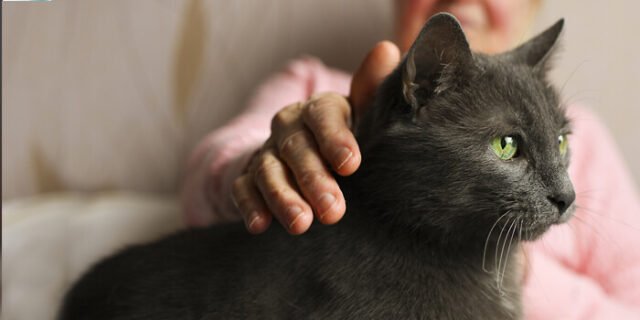Whether our feline companions have been with us since they could fit inside a slipper or we adopted them as adult cats, the senior stage of their life always comes sooner than we expected. According to AAHA guidelines, cats are deemed “seniors” from ten years old and onwards. This change of status is not necessarily a cause for concern or dismay, as some cats will remain spry well into their old age, but it does call for increased vigilance and extra care on our part to keep them comfortable as they advance in years.
Here are some ways we can ensure optimal quality of life for our older kitties:
Contents
- 1 1. Pay Attention to Hygiene
- 2 2. Find the Right Dietary Balance
- 3 3. Ensure Easy Access to the Litter Box
- 4 4. Provide Exercise
- 5 5. Minimize Stress
- 6 6. Be Wary of Disorientation
- 7 7. Don’t Skip Vet Check-Ups
- 8 8. See Them Off on Their Journey
- 9 9. Memorialize Them Through Art, Ceramic Pet Urns, or Keepsakes
1. Pay Attention to Hygiene
Decreased mobility or energy levels can make senior cats less invested in their daily grooming, which is why they might need a hand. This may seem a trifling matter, but a faulty grooming routine can lead to a host of problems, from discomfort to exposure to bacteria. You can help matters by brushing your cat regularly or by using dry shampoo. Older cats can also be more vulnerable to allergies, so consult with your veterinarian (vet) before introducing any new pet grooming products.
2. Find the Right Dietary Balance
Be sure to monitor your cat’s appetite and weight, and schedule a vet check-up if you notice changes in either, as they can signal dental problems or other underlying health issues. Obviously, keeping your cat’s weight within healthy parameters is a good call at any age, but it becomes even more critical in older cats. Obesity puts cats at greater risk for heart disease and diabetes, and in senior cats, puts an extra strain on already frail joints. Collaborate with your vet to find the diet best suited to your cat’s needs and if your cat needs to lose weight, make sure they do so at a safe pace.
3. Ensure Easy Access to the Litter Box
Age-related conditions, such as arthritis or decreased bladder control, may prevent your cat from reaching the litter box in time. Such incidents tend to become more frequent with age, so be patient with your cat and try to facilitate their access to the litter box. Set up several boxes throughout the house and provide low-sided litter boxes to make it easier for them.
4. Provide Exercise
While you should create a convenient environment for your cat, where litter boxes and feeding stations are within easy reach, you don’t want them to become too sedentary. Whether your cat is still quick and nimble or has been slowed down by age, provide regular exercise adjusted to their mobility levels. Even engaging them in brief play sessions can work wonders for their general well-being.
5. Minimize Stress
In older cats, just as it is with humans, stress is to be avoided. Strive to eliminate or minimize stress factors, bearing in mind that senior cats are more likely to be jarred by sudden changes in their routine. Cats can also become less sociable with age, so if possible, allot a separate room for them, where they can find refuge from visitors or the antics of younger kitties.
6. Be Wary of Disorientation
As they advance in years, cats may experience cognitive problems. Signs to be wary of range from spatial disorientation to loud vocalization, often in the middle of the night. If your cat starts exhibiting such symptoms, it might be time to seek your vet’s help. Once a diagnosis of cognitive dysfunction has been confirmed, your veterinarian can prescribe treatment to slow down the process or counteract some of the effects.
7. Don’t Skip Vet Check-Ups
Keeping a close watch on our cats’ behavior is very important, but an untrained eye can miss the early signs of more serious age-related conditions. Furthermore, in some diseases, such as some forms of cancer, the symptoms only appear in an advanced stage. Regular vet check-ups and blood work can help prevent such unfortunate situations and increase the chance of a favorable outcome. Specialists recommend bi-annual check-ups (every six months) for senior cats.
8. See Them Off on Their Journey
As we focus on prolonging our pets’ lives, we usually shrink from the thought that their time with us is limited. However, as they grow older or develop more serious health problems, we must face the truth that we will have to part one day. In some cases, you may even be faced with the heartbreaking choice that comes up when their quality of life declines sharply. However daunting it may be for you if you decide to let your cat go, be with them at the very end. You want them to move on wrapped in the love and comfort of your presence rather than in fear among strangers. Think of it as the proper send off as they embark on their journey.
9. Memorialize Them Through Art, Ceramic Pet Urns, or Keepsakes
Losing a loved one is always painful, but the grief associated with pet loss is sometimes compounded by a sense of isolation. Family or friends may not understand your need to mourn a beloved pet. Finding ways to memorialize your cat can help with the grieving process and keep them alive in your heart. Art is a very therapeutic way of honoring your cat’s memory. Hosting a small memorial and choosing a handmade, personalized ceramic pet urn or keepsake for their ashes can also help you find closure. Simply put, memorializing helps us shift our focus from the pain of loss to the entirety of our pets’ lives and the gift of their presence in our lives.
Ultimately, we never know how much longer our feline companions will be with us, but we can do our best to make their time with us as comfortable as possible and be grateful for every day we get. Cats live in the present and enjoy every carefree moment in the sun. We should strive to do the same.




